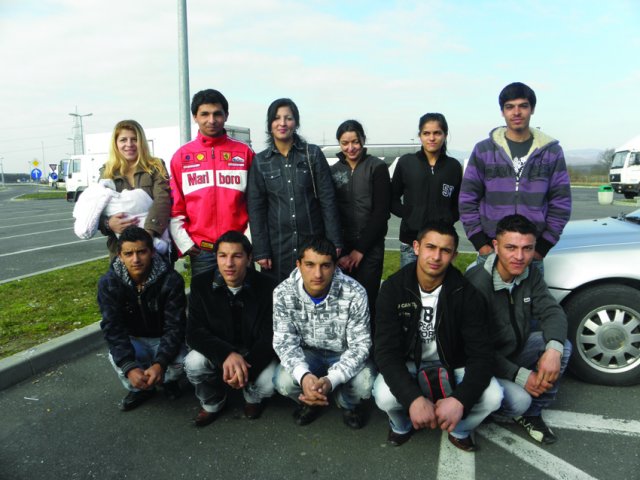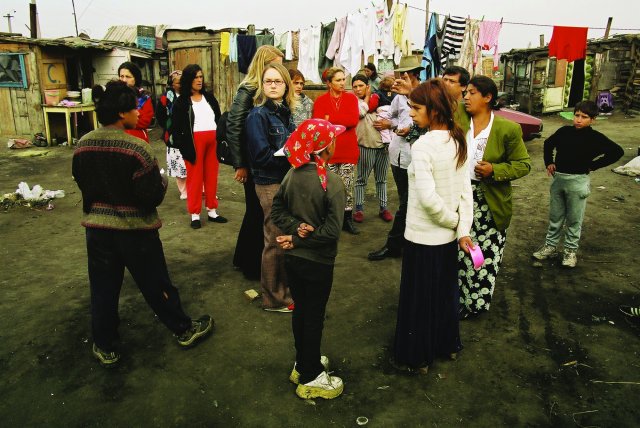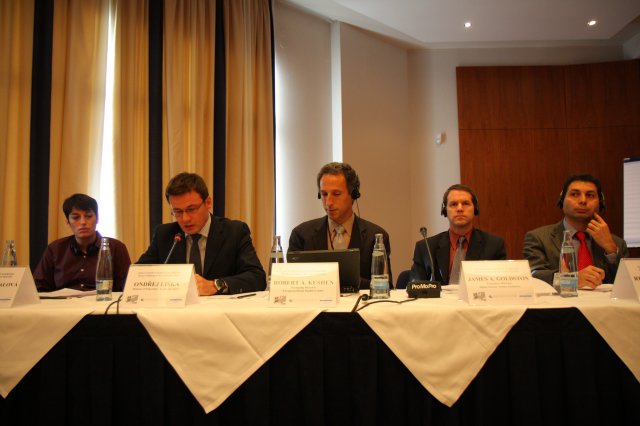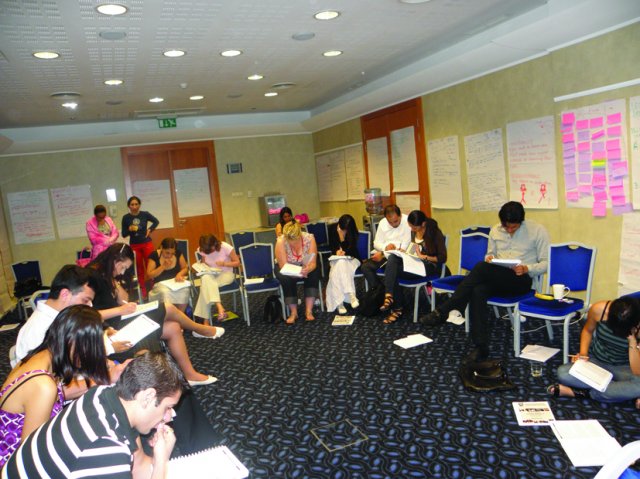Overview
The European Roma Rights Centre (ERRC) is a Roma-led international public interest law organisation working to combat anti-Romani racism and human rights abuse of Roma through strategic litigation, research and policy development, advocacy and human rights education.
Since its establishment in 1996, the ERRC has endeavoured to provide Roma with the tools necessary to combat discrimination and achieve equal access to justice, education, housing, health care and public services.
The ERRC has consultative status with the Council of Europe, as well as with the Economic and Social Council of the United Nations. The ERRC has been the recipient of numerous awards for its efforts to advance human rights respect of Roma: in 2018, Access to Justice Award, in 2018, Columbia Global Freedom of Expression Prize, in 2018, Raoul Wallenberg Prize, in 2013, PL Foundation Freedom Prize; in 2012, Stockholm Human Rights Award; in 2010, the Silver Rose Award of SOLIDAR; in 2009, the Justice Prize of the Peter and Patricia Gruber Foundation; in 2007, the Max van der Stoel award given by the High Commissioner on National Minorities and the Dutch Foreign Ministry; and in 2001, the Geuzenpenning award (the Geuzen medal of honour) by Her Royal Highness Princess Margriet of Netherlands.
The ERRC’s main goal is not to defeat antigypsyism in any one thematic area or country, but to expose its breadth and perverse variety, and to enable Romani organisations and individuals to use a rights-based approach – especially litigation – to defeat it.
Our work is currently concentrated in the following thematic areas:
Major Achievements
As one of the leading NGOs working on Roma rights issues in Europe, the ERRC has:
- Exposed and condemned the systemic abuse of Roma rights across Europe;
- Focused public attention and political priorities on the human rights situation of Roma in Europe;
- Contributed to the development of public interest law in the region, through litigation and legal training in the field of Roma rights;
- Secured access to justice and redress for human rights violations for Roma across Europe;
- Developed significant jurisprudence on discrimination in access to education and the state response to racially-motivated violence through a series of landmark cases before the European Court of Human Rights;
- Influenced the human rights aspects of EU enlargement, through monitoring of compliance with the “Copenhagen criteria” by EU candidate countries and ensuring that the situation of Roma is addressed as a priority issue by both EU Member States and candidate countries;
- Written several significant policy documents on behalf of the European Commission (Roma in an Enlarged European Union) and the Fundamental Rights Agency (Housing Conditions of Roma and Travellers in the EU and The Situation of Roma EU Citizens Moving to and Settling in Other EU Member States); and
- Become one of the leading advocates in implementing anti-discrimination and human rights law in Europe.
Governance, Funding and Accountability
The ERRC is governed by a multinational Board of Directors consisting of Romani and non-Romani lawyers, human rights activists and businesspeople.
The ERRC receives funding from a number of sources, including private foundations, international organisations and governments. Further information about current donors is available upon request.
The ERRC maintains the highest standards of fiscal accountability, through staff and Board oversight and annual audits by external auditors according to the standards issued by the International Federation of Accountants (IFAC).
Strategic Litigation
The ERRC has set in motion more than 500 court cases in 15 countries to bring to justice state and non-state actors who have discriminated against Romani individuals or have committed violence against them. It has secured over 2 million EUR in compensation for Romani individuals for the abuse they have suffered and the subsequent failure of their respective governments to ensure justice.
 The ERRC engages in strategic litigation seeking to reverse patterns of human rights abuse and discrimination against Roma. ERRC legal work aims to empower Roma through law and strengthen the network of legal advocates working on behalf of Roma.
The ERRC engages in strategic litigation seeking to reverse patterns of human rights abuse and discrimination against Roma. ERRC legal work aims to empower Roma through law and strengthen the network of legal advocates working on behalf of Roma.
The ERRC is active in both domestic and international litigation. The ERRC supports local lawyers in domestic legal proceedings both professionally and financially. When domestic remedies are exhausted, the ERRC prepares legal submissions to international tribunals, including the European Court of Human Rights, the European Committee of Social Rights and UN treaty bodies.
Research and Advocacy
The ERRC’s extensive research programme has provided reliable data about the human rights situation of Roma. The focus includes racially-motivated violence against Roma and the impact of individual practices and structural forms of discrimination on the access of Roma to economic and social rights. This work aims to assess the impact of law and policy and contribute to awareness-raising, policy development and strategic litigation.
 The ERRC works to ensure that human rights issues facing Romani communities are firmly on the political agenda in Europe and beyond.
The ERRC works to ensure that human rights issues facing Romani communities are firmly on the political agenda in Europe and beyond.
Some recent and ongoing ERRC campaigns include support for: effective state responses to violence and hate speech against Roma; school desegregation; an end to forced evictions and other housing rights abuse; implementation of comprehensive anti-discrimination law; justice for victims of coercive sterilisation; and Romani women’s rights.
Media and Communications
The ERRC maintains an extensive archive of Roma rights related information on its website and publishes human rights reports, press releases, a regular newsletter, the prestigious journal Roma Rights, pamphlets, position papers and educational materials. Information is regularly shared via an electronic listserve.
 The ERRC has published over 25 book-length reports documenting the human rights situation of Roma in Albania, Austria, Bosnia and Herzegovina, Bulgaria, the Czech Republic, France, Greece, Hungary, Italy, Macedonia, Poland, Portugal, Romania, Russia, Slovakia, and Ukraine. The ERRC has also produced more than 100 advocacy submissions to international treaty-monitoring bodies.
The ERRC has published over 25 book-length reports documenting the human rights situation of Roma in Albania, Austria, Bosnia and Herzegovina, Bulgaria, the Czech Republic, France, Greece, Hungary, Italy, Macedonia, Poland, Portugal, Romania, Russia, Slovakia, and Ukraine. The ERRC has also produced more than 100 advocacy submissions to international treaty-monitoring bodies.
The ERRC works closely with various media through outreach, education and information sharing, in order to improve coverage of Roma rights related matters in Europe and ensure balanced reporting concerning Roma.
Human Rights Education
 ERRC human rights education activities aim to empower Romani activists to promote human rights respect and equality of Roma, using the international human rights framework. The ERRC also targets other groups within wider society, such as judges and lawyers, to achieve these aims.
ERRC human rights education activities aim to empower Romani activists to promote human rights respect and equality of Roma, using the international human rights framework. The ERRC also targets other groups within wider society, such as judges and lawyers, to achieve these aims.
The ERRC’s human rights education portfolio includes: internships for Romani activists; Roma rights workshops targeting Romani activists; thematic or country specific training initiatives targeting legal professionals (Roma and non-Roma); legal traineeships for Romani lawyers; and gender equality research fellowships for Romani activists.




